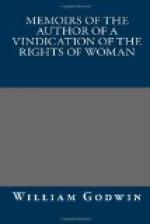Wales however was Mr. Wollstonecraft’s residence for little more than a year. He returned to the neighbourhood of London; and Mary, whose spirit of independence was unalterable, had influence enough to determine his choice in favour of the village of Walworth, that she might be near her chosen friend. It was probably before this, that she has once or twice started the idea of quitting her parental roof, and providing for herself. But she was prevailed upon to resign this idea, and conditions were stipulated with her, relative to her having an apartment in the house that should be exclusively her own, and her commanding the other requisites of study. She did not however think herself fairly treated in these instances, and either the conditions abovementioned, or some others, were not observed in the sequel, with the fidelity she expected. In one case, she had procured an eligible situation, and every thing was settled respecting her removal to it, when the intreaties and tears of her mother led her to surrender her own inclinations, and abandon the engagement.
These however were only temporary delays. Her propensities continued the same, and the motives by which she was instigated were unabated. In the year 1778, she being nineteen years of age, a proposal was made to her of living as a companion with a Mrs. Dawson of Bath, a widow lady, with one son already adult. Upon enquiry she found that Mrs. Dawson was a woman of great peculiarity of temper, that she had had a variety of companions in succession, and that no one had found it practicable to continue with her. Mary was not discouraged by this information, and accepted the situation, with a resolution that she would effect in this respect, what none of her predecessors had been able to do. In the sequel she had reason to consider the account she had received as sufficiently accurate, but she did not relax in her endeavours. By method, constancy and firmness, she found the means of making her situation tolerable; and Mrs. Dawson would occasionally confess, that Mary was the only person that had lived with her in that situation, in her treatment of whom she had felt herself under any restraint.
With Mrs. Dawson she continued to reside for two years, and only left her, summoned by the melancholy circumstance of her mother’s rapidly declining health. True to the calls of humanity, Mary felt in this intelligence an irresistible motive, and eagerly returned to the paternal roof, which she had before resolutely quitted. The residence of her father at this time, was at Enfield near London. He had, I believe, given up agriculture from the time of his quitting Wales, it appearing that he now made it less a source of profit than loss, and being thought advisable that he should rather live upon the interest of his property already in possession.




